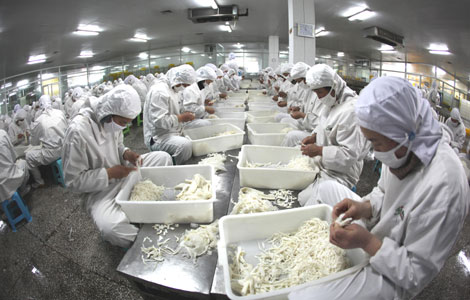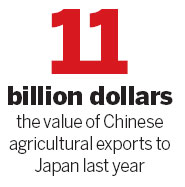
|
 |
|
Workers processing squid for export to Japan in Ganyu county, Jiangsu province. China will work to strike a balance in its agricultural trade with Japan and South Korea. [Photo/China Daily] |
"China won't comprehensively charge high prices for its agricultural products when they enter Japanese and South Korean markets following the establishment of a trilateral free trade agreement," said Sun Yuanjiang, deputy director-general of the international department of the ministry.
China, Japan and South Korea, East Asia's three leading economies, agreed on Sunday at a Beijing summit to start talking about forming a free trade agreement this year.
Sun, who is also the chief Chinese negotiator for the agreement, said Japan and South Korea overprotect their own agricultural industries and that trade disputes over agriculture goods have put up a barrier to the establishment of an agreement.
According to a survey by the Organization for Economic Cooperation & Development - an organization that promotes world trade and helps to coordinate its members' economic policies - 63 percent of South Korean farmers' revenues come from government subsidies. For Japanese farmers, the number is 53 percent. These are the two highest percentages for any countries in the world.
 |
"Overprotection has resulted in the price of agricultural goods in Japan and South Korea being unreasonably high," said Bian Zhenhu, director at the ministry's China Chamber of Commerce of Foodstuffs & Native Produce. "In contrast, Chinese agricultural goods are less expensive."
A report from the School of Agricultural Economics and Rural Development at Renmin University of China suggests that Japanese rice costs 11 times as much as Chinese rice and that South Korean rice costs five times as much. Meanwhile, Japanese soybeans cost eight times as much as Chinese soybeans and South Korean soybeans cost seven times as much.
The high tariffs set on agricultural goods in the Japanese and South Korean markets are expected to decrease to a certain extent once the trade agreement is established, providing a fairer market for trade among the three countries.
Last year, the value of Chinese agricultural exports to Japan hit $10.99 billion. The value of the country's agriculture exports to South Korea was $4.17 billion in 2011, an 18.3 percent increase year-on-year.
Of China's agricultural exports, those to Japan and South Korea accounted for 25.2 percent of the total.
"With Chinese agricultural products entering the Japanese and South Korean markets and meeting the demand from those places, China will consider the industrial characteristics of Japan and South Korea and reach a trade balance with them," Sun said.
"In the long term, the pattern of agricultural trade won't be changed because the three countries are at different stages of development - in the developing, developed and emerging industrial stages," said Zeng Yanchu, a professor at Renmin University.
Zeng suggested that Japan and South Korea boost their exports of high-end food and agricultural products to China.